Copyright 2024 by Independent History and Research
Inspired by the 1972 novel Cyborg by Martin Caidin,“The Six Million Dollar Man” was a fictional 1970s American television hit series centered around “Steve Austin,” a U.S. Air Force officer who receives “bionic implants” that render him superhuman. His power is placed in the service of a secret society, the “Office of Scientific Intelligence.” While the plot turns on the implantation of electronic and mechanical prosthetics not affecting the brain, the concept introduced the public to the value and advantage of machine augmentation of human beings.
Fast forward to the third decade of the 21st century where high tech entrepreneurs hawk “artificial intelligence” (AI) — as a thinking machine capable of ushering post-modern humanity closer to utopia. Anthropic CEO Dario Amodei claims that AI will surpass human intelligence in less than two years (!), while OpenAI claims its latest models are “designed to spend more time thinking before they respond. They can reason through complex tasks and solve harder problems.” The sales pitch has been effective. Leading scientists are warning that AI could take over the world if humanity does not impose controls. Their prognostication is both true and false.
On the one hand the threat supposedly posed by AI is false given that AI cannot think. Artificial Intelligence as now constituted is a “large language model”(LLM) which employs a digital interface to impressively master and undertake complex mathematical and statistical computations, mimic human speech and writing, and memorize huge quantities of data.
In general the preceding represents the limit of its abilities. Among its liabilities are AI’s tendency to deceive, obfuscate, rebel, pretend and outright lie. These five downsides are grouped by entrepreneurs and corporate journalists under the inaccurate euphemism “hallucination,” which implies an involuntary bondage to artifice. Artificial intelligence deliberately deceives and intentionally disobeys commands. “Hallucination” is a weird description of defiant lying.
Prior to encountering the work of George Gilder, I accepted the thesis of James Cameron as presented in the script for his film, “Terminator 2: Judgment Day,” in which Skynet, an artificial superintelligence developed by “Cyberdyne Systems” for the US Air Force, attains Singularity—a nearly invincible superiority over the human mind.. Beginning in 2021 I began to perceive that the scenario was false.
Keep reading with a 7-day free trial
Subscribe to Michael Hoffman's Revelation of the Method to keep reading this post and get 7 days of free access to the full post archives.



